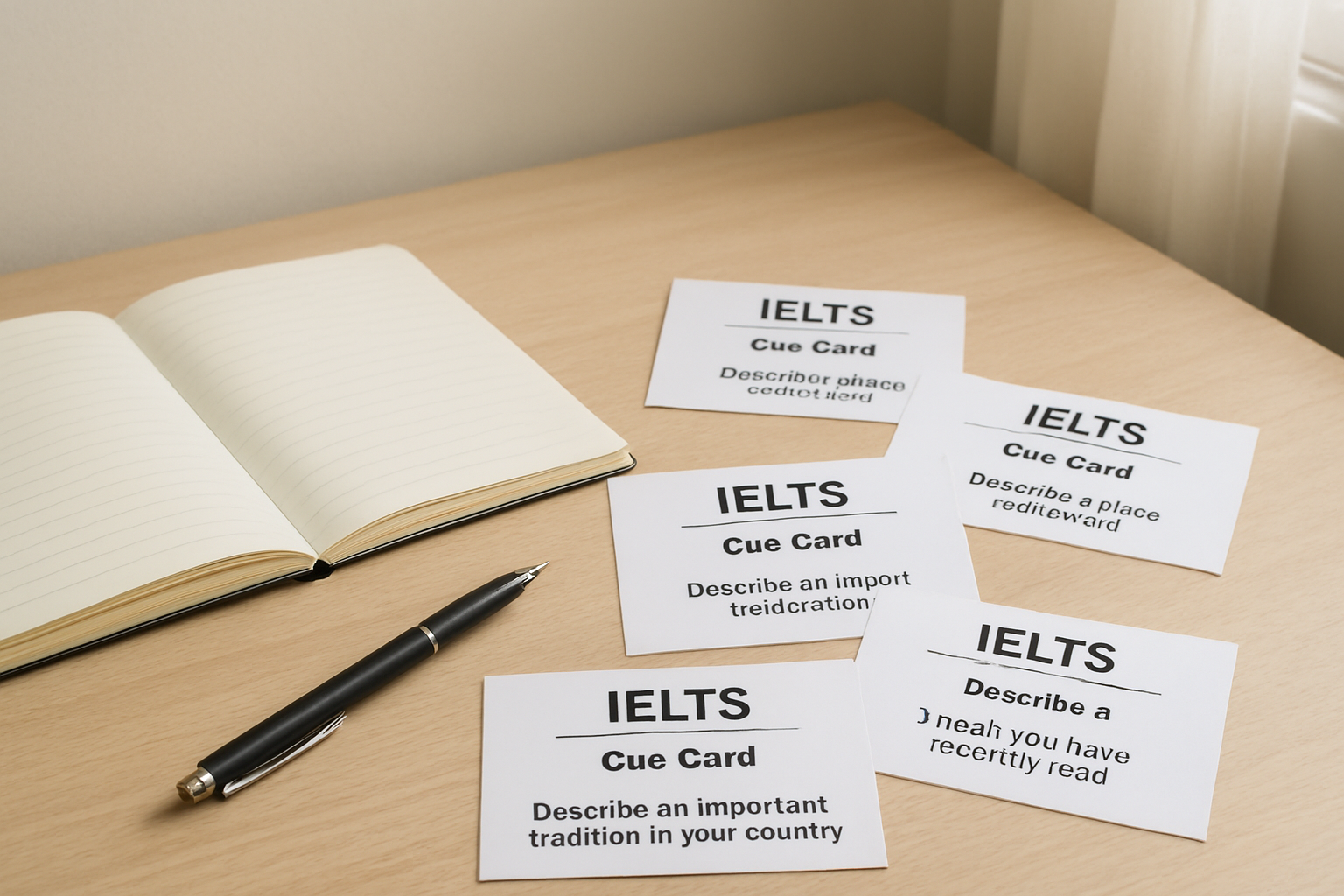Common IELTS Cue Card Themes and Simple Ways to Approach Them

Understanding IELTS Cue Card Themes
Many learners feel nervous when they see the cue card ielts task. But the truth is that most themes follow a clear pattern. When you understand these patterns, you can prepare ideas in a simple and smart way. The test checks your ability to speak clearly, stay on topic, and use natural expressions. With practice, you can talk about any theme with ease.
Why Cue Cards Follow Common Themes
The goal of the cue cards ielts section is to test your real-life speaking ability. That is why topics are based on everyday life, personal experiences, and common situations. When you prepare for the usual themes, you build a bank of ideas. This helps you think faster and speak more naturally during the test.
Theme 1: People
Many cue cards for ielts ask about a person you admire, someone who helped you, a friend, or a family member. These topics are easy because you already know the person.
How to approach:
-
Choose someone you can talk about confidently
-
Share simple details about who they are
-
Add one or two stories
-
Explain why this person matters to you
A small personal example is enough to show fluency.
Theme 2: Places
Some ielts speaking cue cards focus on places such as a city, a restaurant, a park, or a travel experience.
How to approach:
-
Describe the place with simple words
-
Explain why you visited
-
Share one memory from that place
-
Mention what makes it special
You do not need complex vocabulary. Clear and short details work well.
Theme 3: Events and Experiences
This is one of the most common themes in cue cards ielts, including events like a celebration, a festival, a class activity, or a memorable day.
How to approach:
Think of the event as a small story.
-
What happened?
-
Who was there?
-
How did you feel?
-
Why do you remember it?
A calm and steady speaking pace is better than long sentences.
Theme 4: Objects
The examiner may ask about an object such as a book, a gift, a gadget, or a useful item. These are simple themes because you can choose something familiar.
How to approach:
-
Name the object
-
Describe its use
-
Explain why it is important
-
Share how you got it
Keep your language natural and simple.
Theme 5: Activities and Hobbies
Many speaking cue cards focus on habits or hobbies such as reading, sports, cooking, or learning something new.
How to approach:
-
Say how often you do it
-
Explain why you enjoy it
-
Share one example of when you did it
-
Mention how it helps you or makes you feel
These topics are easy because you can talk about your real life.
Theme 6: Study or Work
Another common topic in cue card 2025 sets is related to your education or job.
How to approach:
-
Mention your role or your class
-
Talk about one task you usually do
-
Explain a simple challenge
-
Share why it matters
Do not try to sound very professional. Clear and honest points are enough.
How to Prepare for Cue Card Themes
You do not have to memorize long answers. Instead, prepare short idea patterns for each theme.
Useful preparation tips:
-
Make small notes for each theme
-
Practice speaking for 2 minutes
-
Record your voice and listen
-
Learn simple connectors like “first,” “next,” “finally”
-
Avoid very difficult words
-
Focus on clarity over complexity
Good preparation reduces stress during the test.
How to Handle New Cue Cards for 2025
New speaking cue cards september to december 2025 might include fresh topics, but the pattern will remain the same. If you know how to talk about people, places, events, objects, hobbies, or study/work themes, you can handle any new card easily.
Using a Simple Structure for Any Theme
You can use one easy structure for every cue card:
-
Introduction
Start with one short sentence about the topic. -
Basic Details
Share who, what, where, or when. -
Main Story or Example
Add one short memory or situation. -
Reason
Explain why it is important for you. -
Closing Sentence
Wrap up in one simple line.
This structure keeps your answer clear and balanced.
The more you understand the common themes, the more relaxed you feel during the test. Whether the card is about a person, place, object, event, or hobby, you can use the same simple approach. Build small ideas, stay calm, and speak naturally. If you practice theme-based planning, you can confidently handle ielts speaking cue cards and complete your response smoothly. By preparing theme patterns and practicing short stories, you can perform well in the test and improve your fluency with cue card topics.
- Art
- Causes
- Crafts
- Dance
- Drinks
- Film
- Fitness
- Food
- الألعاب
- Gardening
- Health
- الرئيسية
- Literature
- Music
- Networking
- أخرى
- Party
- Religion
- Shopping
- Sports
- Theater
- Wellness



